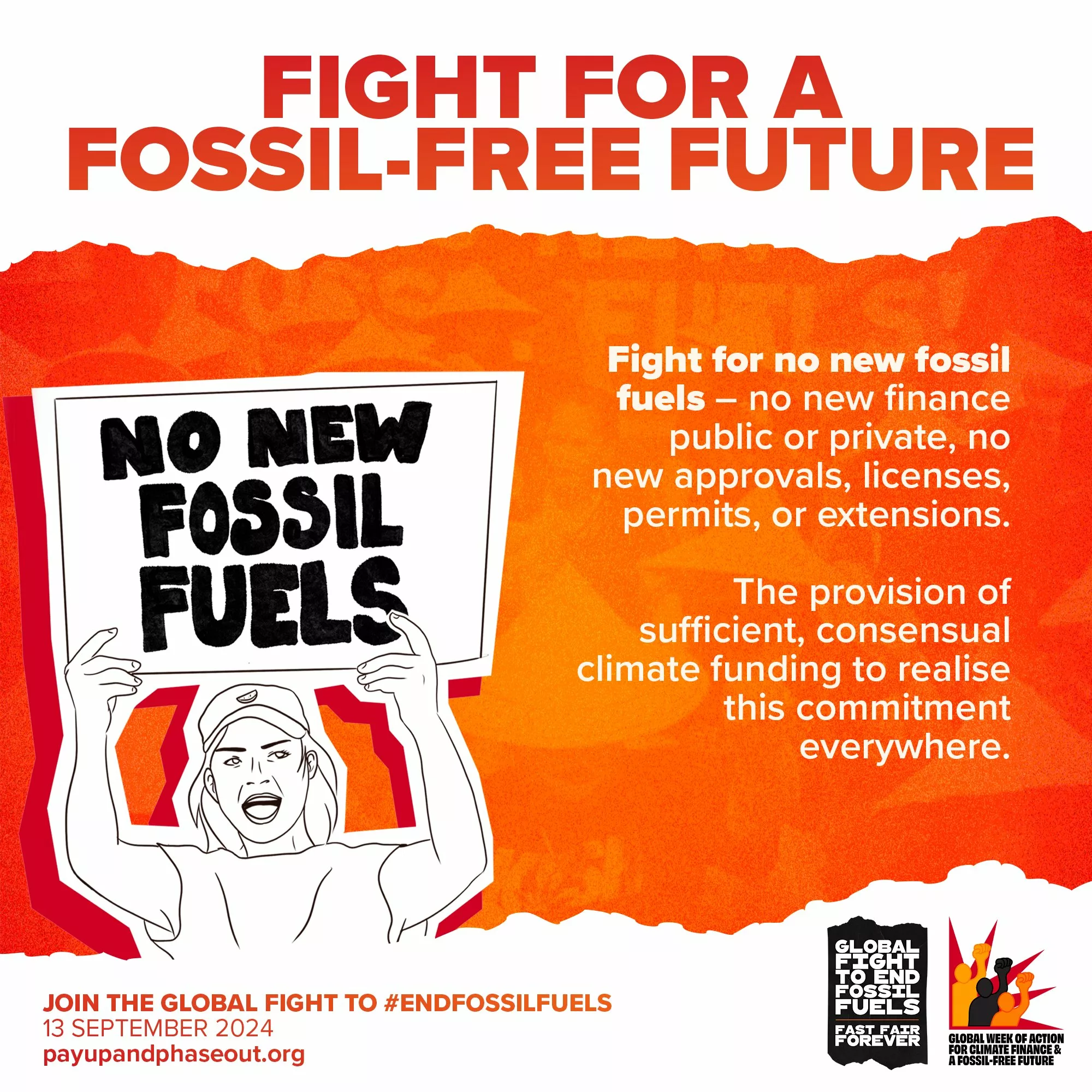|
Getting your Trinity Audio player ready...
|
Byron Adonis Mutingwende
As the world heads towards COP 29, the issues of climate finance and a fossil fuel phase-out towards a just energy transition are ever more critical for climate action. The upcoming UN General Assembly, the UN Summit of the Future, and the Global Renewables Summit all taking place one after the other in September, provide an important opportunity to reiterate demands and escalate public pressure to compel governments, international institutions, and corporations to listen and take action.
The governments of the Global North have consistently failed for decades to undertake their fair share of climate action both domestically and internationally. This fair share includes the delivery of climate finance for the Global South, an obligation that they committed to as parties to the UN Framework Convention on Climate Change. Climate finance is also part of reparations for climate debt they owe to the people of the South for historical and continuing harms caused by their disproportionately large contributions to the climate crisis.
The second day of Global Week of Action for Climate Finance and a Fossil-Free Future is focusing on “Just Transition” a two-word phrase that is gaining traction globally as societies grapple with the urgent need to address climate change while ensuring that the shift toward sustainability is equitable and inclusive.
For Zimbabwe, a nation rich in natural resources yet facing significant socio-economic challenges, a Just Transition is not just beneficial; it is essential.
Zimbabwe’s economy has historically relied on sectors such as agriculture, mining, and manufacturing, which are vulnerable to climate impacts. A Just Transition emphasizes the need for sustainable practices in these sectors, promoting resilience against climate shocks.
By investing in renewable energy and sustainable agricultural practices, Zimbabwe can enhance food security and create jobs, leading to a more robust economy.
A Just Transition prioritizes social equity, ensuring that marginalized communities, including women, youth, and rural populations, are not left behind. In Zimbabwe, where inequality is pervasive, this approach can empower vulnerable groups by providing access to green jobs and training in sustainable practices. This inclusivity fosters social cohesion and mitigates conflict over resources.
Zimbabwe is home to diverse ecosystems that are under threat from climate change, deforestation, and unsustainable practices. A Just Transition involves adopting environmentally friendly policies that protect these ecosystems while promoting sustainable livelihoods. By restoring degraded lands and promoting biodiversity, Zimbabwe can ensure a healthier environment for future generations.
Implementing a Just Transition requires strong governance and effective policy frameworks. Zimbabwe must enhance its climate policies to integrate social justice principles, ensuring that all stakeholders have a voice in the transition process. This includes engaging local communities in decision-making and ensuring transparency in the management of natural resources.
Zimbabwe can benefit from global partnerships and financial support aimed at fostering a Just Transition. Engaging with international organizations and other countries can provide the necessary resources and technology transfer to advance sustainable development goals. This cooperation is vital for building the capacity to address climate challenges effectively.
A Just Transition in Zimbabwe represents an opportunity to tackle climate change while fostering economic growth, social equity, and environmental sustainability. By prioritizing inclusivity and resilience, Zimbabwe can build a future that not only addresses current challenges but also lays the foundation for a more equitable and sustainable society. Embracing this transition is not merely an option; it is imperative for the well-being of all Zimbabweans.
Below are essential quotes from Climate Action Network Zimbabwe members:
Wellington Madumira: “A just transition means ensuring that the shift to a low-carbon economy is fair and inclusive, leaving no one behind.”
Tafadzwa Gwini from Kuwadzana press: “We must listen to the voices of those most affected by climate change and ensure they have a seat at the table in the transition process.”
Tendai Gracious Moyo from Let’s Green The Future Foundation: “A just transition requires a commitment to equity and justice, prioritizing the needs of workers and communities over corporate interests.”
Sherperd Zvigadza from Southern Africa Climate Action Network: “We need to invest in people, not just technology. The transition must create quality jobs and support workers through retraining and reskilling.”
Roselyn Ushewekunze from Food Justice Network: “If we want to build a world that works for everyone, we need to shift our focus from profits to people.”
Justice Zvaita from Zimbabwe Climate Change Coalition: “Climate justice is about social justice; we must ensure that the most vulnerable communities are empowered and included in the transition.”






